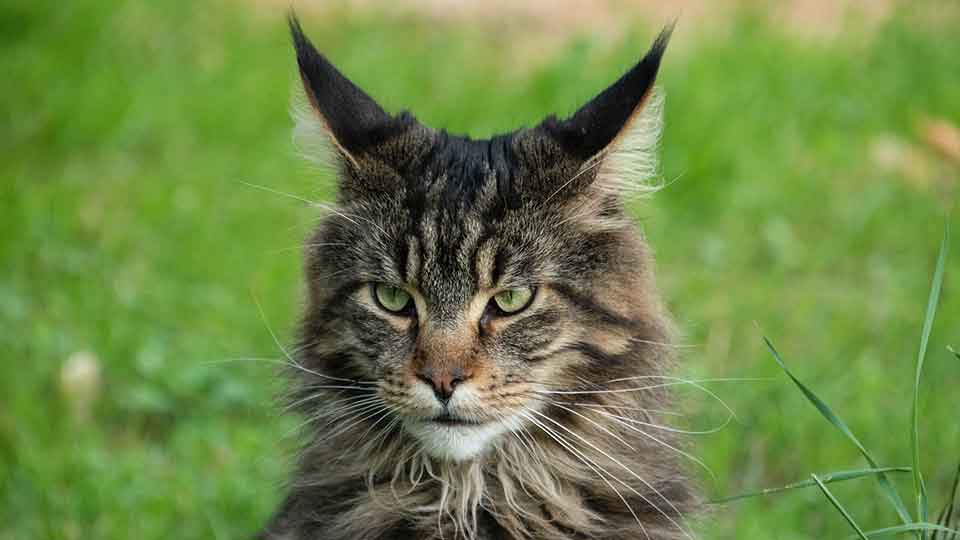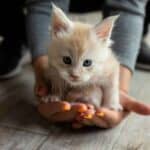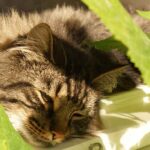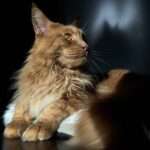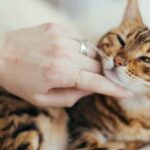Maine Coons are known for their large size, shaggy coat, and adventurous personality, which might make them seem like natural outdoor explorers.
However, many risks and challenges come with letting your Maine Coon cat go outside, such as predators, diseases, traffic, and weather.
In this post, I will discuss the pros and cons of letting your Maine Coon cat go outside, and offer some tips on making the best decision for your cat and yourself.
Can Maine Coon Cats Go Outside?
The answer to this question is complex, as it depends on many factors, such as your cat’s personality, health, age, environment, and preferences.
Some Maine Coon cats may enjoy going outside and exploring the world, while others may prefer staying indoors and enjoying the comfort and safety of their home.
Some may be able to adapt to different weather conditions, while others may be sensitive to heat or cold.
Some may be friendly and sociable with other animals and people, while others may be shy or aggressive.
The best way to find out if your Maine Coon cat can go outside is to observe their behavior and temperament.
If your cat shows signs of curiosity, boredom, or frustration indoors, they might benefit from outdoor stimulation.
If your cat is healthy, vaccinated, spayed or neutered, microchipped, and has a collar with an ID tag, they might be ready to venture outside.
However, if your cat is sick, elderly, injured, or has special needs, they might be better off staying indoors.
How Long Can Maine Coon Cats Go Outside?
The length of time that your Maine Coon cat can go outside depends on several factors, such as the weather, the time of day, the season, the location, and the availability of food and water.
Generally speaking, you should not let your Maine Coon cat go outside for more than a few hours and always supervise them or provide them with a safe enclosure.
You should also avoid letting your cat go outside at night when they are more likely to encounter predators, traffic, or other dangers.
Maine Coons adapt to cold climates, but they can still suffer from frostbite or hypothermia if they are exposed to extreme temperatures for too long.
They also have a thick coat that can overheat them in hot weather, so you should provide plenty of shade and water if they go outside in the summer.
You should also monitor your cat for signs of dehydration, heatstroke, sunburn, or parasites that can affect their health.
Will Maine Coons Run Away?
Maine Coons are not known for being particularly wanderlustful or independent cats, but they can still run away if they are scared, curious, or bored.
They can also get lost or stolen if they roam far from home or encounter unfamiliar people or animals.
Therefore, you should always watch your Maine Coon cat when they go outside, and train them to come when called.
You can also use a leash, a harness, or a GPS tracker to keep track of your cat’s whereabouts and prevent them from running away.
Do You Have To Walk A Maine Coon?
Walking a Maine Coon cat is not mandatory, but it can be a fun and rewarding for you and your cat.
Walking a cat can provide them with physical exercise, mental stimulation, socialization, and bonding opportunities to improve their health and happiness.
It can also reduce their stress levels, boredom, and destructive behaviors from being confined indoors.
However, walking a cat is more challenging than a dog, requiring patience, training, and proper equipment.
Not all cats are comfortable wearing a leash or a harness or being exposed to unfamiliar sights and sounds.
Therefore, you should start slowly and gradually introducing your cat to walking outside.
You should also respect your cat’s preferences and limits, and never force them to do something they don’t want.
Why Other Cat Owners Keep Their Miane Coon Cat Inside?
While some cat owners may let their Maine Coon cats go outside occasionally or regularly, others may keep them indoors permanently.
There are many reasons why some cat owners keep their Maine Coon cats inside, such as:
• Safety: Keeping your Maine Coon cat inside can protect them from dangers they can encounter outside, such as predators, diseases, traffic, poisons, traps, or human cruelty. Indoor cats are less likely to get injured or killed by these threats, and they can live longer and healthier lives.
• Responsibility: Keeping your Maine Coon cat inside can prevent them from causing harm to other animals or people outside, such as birds, rodents, reptiles, or plants.
Indoor cats are less likely to hunt or kill these creatures, and they can reduce their environmental impact. They can also avoid getting into fights or conflicts with other cats or dogs, resulting in injuries or infections.
• Convenience: Keeping your Maine Coon cat inside can save you time and money that you would otherwise spend on caring for them outside. Indoor cats do not need as much grooming, veterinary care, or supervision as outdoor cats, and they can be easier to manage and train. They can also avoid bringing dirt, fleas, ticks, or other pests into your home.
Final Thoughts
Letting your Maine Coon cat go outside is a personal choice that depends on many factors, such as your cat’s personality, health, age, environment, and preferences.
Both options have pros and cons, and you should weigh them carefully before making a decision.
You should also consult your veterinarian and follow their recommendations on keeping your cat safe and healthy outside or inside.
Whatever you choose, you should always provide your Maine Coon cat with love, care, and attention that they deserve.
FAQ
Are Maine Coons good house cats?
Maine Coons are good house cats for many reasons.
They are friendly, loyal, intelligent, and playful. They enjoy interacting with their owners and other pets and can be trained to do tricks or walk on a leash.
They also have a thick, water-resistant coat that helps them cope with different weather conditions.
However, Maine Coons also have some special needs and challenges that may not suit every household.
They are large and muscular cats that need much space and exercise.
They may be unsuitable for small apartments or homes with limited outdoor access. They also need regular grooming to prevent mats and tangles in their fur and they may shed a lot.
Maine Coons are also prone to health issues, such as hip dysplasia, hypertrophic cardiomyopathy, and polycystic kidney disease.
They may require more veterinary care and attention than other breeds. They also have a long lifespan, averaging 12 to 15 years, which means a long-term commitment from their owners.
Therefore, Maine Coons are good house cats for people who can provide enough space, stimulation, care, and love.
They are not ideal for people allergic to cats, have limited time or resources, or prefer low-maintenance pets.
What are the best outdoor cats?
The best outdoor cats can adapt to different environments, weather conditions, and situations.
They are usually confident, curious, agile, energetic, and independent. They also have good hunting skills and instincts to protect themselves from predators and dangers.
Some of the best outdoor cat breeds are:
• Abyssinian: This breed is one of the oldest and most adventurous cat breeds. They are intelligent, outgoing, and love exploring and playing outdoors. They have a slender and athletic body that allows them to easily climb and jump. They also have a short and ticked coat that is resistant to dirt and water.
• Bengal: This breed hybridizes domestic and Asian leopard cats. They look strikingly like mini leopards, with spots or rosettes on their coat. They are very active and playful, and they enjoy swimming and hunting. They are also very smart and trainable, and they can learn to walk on a leash or fetch.
• Norwegian Forest Cat: This breed originates from Northern Europe, where they developed a thick and waterproof coat to survive the cold winters. They are large and muscular cats that can handle harsh weather conditions. They are also friendly and sociable with humans and other animals. They love to climb trees and mountains and have strong claws to help them grip.
• American Bobtail: This breed has a distinctive short tail that is about half or one-third the length of a normal cat’s tail. They are medium to large cats that have a sturdy and muscular build. They are very adaptable and intelligent and can travel well with their owners. They are also calm and gentle and get along well with other pets.
Can Maine Coons live with other cats?
Maine Coons can live with other cats if introduced properly and gradually.
Maine Coons are generally friendly and laid-back with other cats, as they are not very territorial or aggressive.
They may even bond with other cats and become friends or playmates.
However, some factors may affect how well Maine Coons can live with other cats, such as their age, personality, health, history, gender, and breed.
Older Maine Coons may be less accepting of new cats than younger ones.
Some Maine Coons may have different personalities or preferences than others.
Some Maine Coons may have health issues or special needs that may make them less tolerant of other cats.
Some Maine Coons may have had bad experiences with other cats that may make them fearful or hostile.
Male Maine Coons may be more dominant or competitive than female ones. Some cat breeds may be more compatible with Maine Coons than others.
Therefore, it is important to introduce Maine Coons to other cats slowly and carefully, following these steps:
- Keep the new cat in a separate room and let the Maine Coon smell their scent on items like blankets or toys.
- Feed the cats near each other but separated by a door or a gate so they can associate each other with positive things like food.
- Let the cats see each other through a door or a gate but do not let them touch each other yet.
- Supervise the first face-to-face meeting between the cats in a neutral area and provide them with toys or treats to distract them from fighting.
- Repeat the meetings until the cats get used to each other’s presence and show signs of relaxation or curiosity.
- Give each cat their own food bowl, water bowl, litter box, bed, scratching post, toy, etc., so they do not feel like they have to compete for resources.
- Praise both cats when they behave well with each other and separate them if they show signs of aggression or stress.

